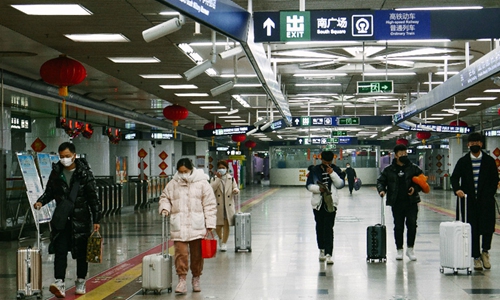HOME >> SOURCE,SPECIAL-COVERAGE
Mask firms in full swing to meet shortage amid battle against coronavirus
By GT staff reporters Source:Global Times Published: 2020/1/30 21:51:40

Photo: Li Hao/GT
When most factories are experiencing some downtime during China's efforts to combat the spread of the novel coronavirus, China's mask producers, among other medical device providers, are busier than ever and have voluntarily suspended holidays in a bid to meet surging domestic demand.
"We are providing three to four times the regular salary to staff and we hired new staff during the holidays. We've also ordered new machines to increase our production capacity," Wu Kangping, who owns companies that produce protective suits and masks in East China's Zhejiang Province, told the Global Times on Thursday.
However, Wu said that though local authorities have been ramping up efforts to help companies recruit local employees, the training, testing and health check processes also take time, noting that the company has been going all out to increase production during the "special time."
"Our company resumed production on January 25 and now we are producing masks in full swing - three shifts 24 hours a day," Chen Wuliang, head of Jiangsu Wudong Pharmaceuticals Co, told the Global Times on Thursday, adding that more than half of its employees did not go back home and stayed in the factory during the holidays.
Like Wu and Chen's factory, across the country, more than 30 enterprises have suspended their vacations and resumed production so far, and the central government has been encouraging more enterprises to resume production to fill shortages.
With workers going back to work after the holidays, and a recovery of raw material supply, it is expected that China could reach normal production capacity after February 3 and produce 180 million masks per day by the end of February, which will greatly ease the tension between supply and demand in addition to imported masks, according to the China Textile Commerce Association.
Shortages are severe, and posts from hospitals asking for protective masks and suits are still rising in face of the disease that had infected almost 8,000 people as of Thursday in China.
"Domestic factories' output is almost all being sent to hospitals so far. For market needs, we are looking for imports from countries like Russia and Japan," Zhang Hongsheng, a purchasing manager from Tianjin-based Taihu online service platform, told the Global Times on Thursday.
Zhang noted that apart from rising demand from hospitals, he also sees a rise of demand from companies that have joined the team to combat the disease on the frontline, which has made the situation even more severe.
On Thursday, Liu Qing, CEO of China's car-hailing firm Didi Chuxing, said that the company is in urgent demand of masks and protective suits for drivers who are providing services to doctors and patients in Wuhan, the epicenter of the disease, as well as Shanghai and the whole country.
However, being busy does not necessarily mean making a profit. Company representatives told the Global Times that despite rising demand, they are giving up profits to double or triple production capacity to meet the country's rapidly rising demand, which might even affect their supplies to other countries.
"Our company currently paid for all of this extra spending, and the masks and protective suits we made are mostly provided to hospitals in Wuhan, which means we earned no profits from them. We may just donate them," Wu said, adding that his company now is only spending money, not making it.
"Since we are going all out to ensure domestic supply, our customers in other countries, such as the US, might face a delay of supply - which will cause enormous losses to our firm," Wu said.
As the world's manufacturing hub, China accounts for 50 percent of the world's mask production capability, according to media reports.
"But as the whole country is ramping up efforts to combat the virus, we don't have time to care about profits or the businesses anymore, we just want to win the battle," Wu said.
Amid the shortage of medical materials during the epidemic, there have also been some speculators during the national crisis, even though local governments have issued documents to ban merchants from forcing up prices during the country's tough fight against the epidemic.
A pharmacy in Beijing was fined 3 million yuan ($432,482.28) after consumers reported it had sold 10 units of N95 masks, which are in severe shortage in China amid the battle against the novel coronavirus, at 850 yuan. The price of the same masks online is only 143 yuan, according to a report of The Beijing News on Wednesday.
The Beijing pharmacy is not an individual case amid a severe shortage of medical materials during the epidemic.
A Global Times reporter learned that in Southwest China's Chongqing Municipality, which is near Hubei and one of the areas severely affected by the epidemic, the price of one N95 mask has risen to about 40 yuan. A local taxi driver told the reporter that the taxi company had stopped providing masks for free.
"I have to buy masks myself. As few people are taking taxis during the epidemic, all the money I earn every day is only enough to buy some masks," the driver said.
A woman surnamed Wang in Taiyuan, North China's Shanxi Province, told the Global Times on Thursday that she was angry at such behavior.
"Everybody is uniting to fight against the epidemic in face of the current serious situation. Many abroad even donated masks, but these people, they not only did not try to contribute, but they fish in troubled waters. Shame on them!" she said.
Posted in: INDUSTRIES